Joseph Smith, Jr. was born on 23 December 1805 in Sharon, Vermont, to Joseph Smith, Sr. (1771-1848) and Lucy Mack Smith (1775-1856). He had ten siblings, including an unnamed brother who died at birth in 1797, and was the fifth oldest. Of those siblings, five of his brothers – Alvin, Hyrum, Samuel Harrison, William, and Don Carlos – lived to adulthood. Of the six Smith sons, Joseph was the middle son.
In the fall of 1838, during the Missouri Persecutions, Joseph’s father became ill. In spite of that illness, he made the forced exodus from Missouri to Nauvoo, Illinois, in 1839 and died there on 14 September 1840. He was considered a martyr for the cause.
Joseph, like his father for whom he was named, would also die as a martyr at the age of 38 when he was assassinated in the Carthage Jail in Carthage, Illinois by an angry mob on 27 June 1844. But, what happened to his brothers?
Alvin Smith – Faithful Supporter of Joseph’s Work
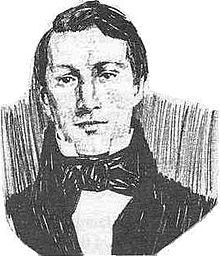 Alvin Smith, the eldest of the Smith sons, was born on 11 February 1798 in Tunbridge, Vermont. When the family moved to upstate New York, he made the offer to leave home to find work, where he would be paid higher wages to help the family pay their debts and build a home. His mother, Lucy Mack Smith would later write:
Alvin Smith, the eldest of the Smith sons, was born on 11 February 1798 in Tunbridge, Vermont. When the family moved to upstate New York, he made the offer to leave home to find work, where he would be paid higher wages to help the family pay their debts and build a home. His mother, Lucy Mack Smith would later write:
By my son’s persevering industry he was able to return to us after much labor, suffering and fatigue with the necessary amount of money for all except the last payment. In two years from the time we entered Palmyra, strangers, destitute of friends, home or employment, we were able to settle ourselves upon our own land in a snug, comfortable, though humble habitation, built and neatly furnished by our own industry (“History of Joseph Smith by His Mother”).
Being a loyal and devoted son, Alvin always wanted to care for his parents, and had a desire to build them a larger and better home in which they could enjoy their later years of life. However, he did not live to fulfill his dream. In mid-November 1823, at the young age of 25, engaged to be married and looking forward to a bright future, he became very ill. His doctor gave him a heavy dose of calomel which lodged in his stomach, and he passed away on Wednesday, 19 November 1823, as a result of mercury poisoning from the calomel he had been given.
As he lay dying, his mother recorded his final words to his young brother Joseph concerning the work which he had been called to do:
Do everything in your power to obtain the record. Be faithful in receiving instruction and in keeping every commandment that is given you … your brother Alvin must now leave you, but remember the example which he has set for you” (“History of Joseph Smith by His Mother”).
On 21 January 1836, in a vision given to Joseph Smith in the temple at Kirtland, Ohio, he saw his brother Alvin in the celestial kingdom. From that vision, Joseph was taught the doctrine of salvation for the dead. Modern-day revelation records the vision and doctrinal teaching in Doctrine and Covenants 137:
The heavens were opened upon us, and I beheld the celestial kingdom of God, and the glory thereof, whether in the body or out I cannot tell. I saw the transcendent beauty of the gate through which the heirs of that kingdom will enter, which was like unto circling flames of fire; also the blazing throne of God, whereon was seated the Father and the Son. I saw the beautiful streets of that kingdom, which had the appearance of being paved with gold. I saw Father Adam and Abraham; and my father and my mother; my brother Alvin, that has long since slept; and marveled how it was that he had obtained an inheritance in that kingdom, seeing that he had departed this life before the Lord had set his hand to gather Israel the second time, and had not been baptized for the remission of sins. Thus came the voice of the Lord unto me, saying: all who have died without a knowledge of this gospel, who would have received it if they had been permitted to tarry, shall be heirs of the celestial kingdom of God; also all that shall die henceforth without a knowledge of it, who would have received it with all their hearts, shall be heirs of that kingdom; for I, the Lord, will judge all men according to their works, according to the desire of their hearts. And I also beheld that all children who die before they arrive at the years of accountability are saved in the celestial kingdom of heaven.
Hyrum Smith – By His Brother’s Side in Life and in Death
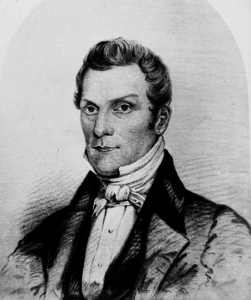 The second eldest son, Hyrum Smith, was born in Tunbridge, Vermont on 9 February 1800. He was as close a brother to Joseph as Alvin had been. Their bond grew even closer when as a boy, Joseph suffered excruciating pain from an abscessed infection in his leg. For hours Hyrum would sit by Joseph’s bedside and hold his leg as tight as he could to help alleviate the pain.
The second eldest son, Hyrum Smith, was born in Tunbridge, Vermont on 9 February 1800. He was as close a brother to Joseph as Alvin had been. Their bond grew even closer when as a boy, Joseph suffered excruciating pain from an abscessed infection in his leg. For hours Hyrum would sit by Joseph’s bedside and hold his leg as tight as he could to help alleviate the pain.
He lived a life of humble service and obedience, and was ordained Patriarch of The Church of Jesus Christ following his father’s death. Throughout his lifetime, he remained a true friend, confidant, counselor, and support to his younger brother in his role as Prophet of the Restoration. Joseph said of Hyrum:
I could pray in my heart that all my brethren were like unto my beloved brother Hyrum, who possesses the mildness of a lamb, and the integrity of a Job, and in short, the meekness and humility of Christ; and I love him with that love that is stronger than death, for I never had occasion to rebuke him, nor he me (Personal Writings of Joseph Smith, comp. and ed. Dean C. Jessee, 2nd ed. rev. (Salt Lake City: Deseret Book, 2002), 138.)
Mary Ann Stearns Winters recalled:
I rejoice in my acquaintance with the Prophet Joseph, and with his brother Hyrum also, for one is not complete without the other—they were nearly always together, and are inseparably connected in mind—Joseph and Hyrum— names ever dear to the faithful (Mary Ann Winters, “Joseph Smith, the Prophet,” Young Woman’s Journal December 1905, 557, quoted in Jeffrey S. O’Driscoll, Hyrum Smith: A Life of Integrity (Salt Lake City: Deseret Book, 2003), 227.)
The two brothers were inseparable in the work of the Lord. Hyrum said of Joseph, “There were prophets before, but Joseph has the spirit and power of all the prophets” (Joseph Smith, History of the Church of Jesus Christ of Latter-day Saints, ed. B. H. Roberts, 2nd ed. rev. (Salt Lake City: Deseret Book, 1957), 6:346.) At the time that Hyrum was called to serve as the Patriarch of the Church, the Lord said to him:
And from this time forth I appoint unto him that he may be a prophet, and a seer, and a revelator unto my church, as well as my servant Joseph. That my servant Hyrum may bear record of the things which I shall show unto him, that his name may be had in honorable remembrance from generation to generation, forever and ever (Doctrine and Covenants 124:94,96.)
Modern-day revelation also tells us that not only were Joseph and Hyrum inseparable in life, but they were also inseparable in death. Doctrine and Covenants 135:3 reads:
Joseph Smith, the Prophet and Seer of the Lord, has done more, save Jesus only, for the salvation of men in this world, than any other man that ever lived in it. In the short space of twenty years, he has brought forth the Book of Mormon, which he translated by the gift and power of God, and has been the means of publishing it on two continents; has sent the fulness of the everlasting gospel, which it contained, to the four quarters of the earth; has brought forth the revelations and commandments which compose this book of Doctrine and Covenants, and many other wise documents and instructions for the benefit of the children of men; gathered many thousands of the Latter-day Saints, founded a great city, and left a fame and name that cannot be slain. He lived great, and he died great in the eyes of God and his people; and like most of the Lord’s anointed in ancient times, has sealed his mission and his works with his own blood; and so has his brother Hyrum. In life they were not divided, and in death they were not separated!
Don Carlos – Similar in Personality to Joseph
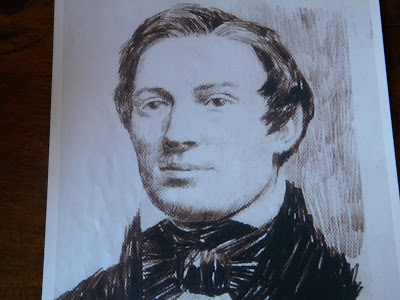 Don Carlos, the youngest brother of Joseph Smith and similar to him in personality, was born in Norwich, Windsor, Vermont on 25 March 1816. He was baptized a member of The Church of Jesus Christ on 9 June 1830 at the age of 14. He bore a strong testimony, and throughout his life, he was a leader, missionary, and periodical editor. On 15 January 1836, he was called to serve as the first president of the High Priests Quorum (today is referred to as the Stake President). He was also a member of the construction crew for the Kirtland Temple, and participated in the ceremony of laying the cornerstones for that temple in early 1841.
Don Carlos, the youngest brother of Joseph Smith and similar to him in personality, was born in Norwich, Windsor, Vermont on 25 March 1816. He was baptized a member of The Church of Jesus Christ on 9 June 1830 at the age of 14. He bore a strong testimony, and throughout his life, he was a leader, missionary, and periodical editor. On 15 January 1836, he was called to serve as the first president of the High Priests Quorum (today is referred to as the Stake President). He was also a member of the construction crew for the Kirtland Temple, and participated in the ceremony of laying the cornerstones for that temple in early 1841.
In 1839, he became the first editor of the Nauvoo, Illinois-based Latter-day Saint newspaper Times and Seasons. As a printer and editor, he was involved in the printing of the 1835 edition of the Doctrine and Covenants, several editions of the Book of Mormon, and also served as the publisher and editor for the short-lived periodical Elders’ Journal.
Don Carlos also served on the Nauvoo, Illinois, city council, and as brigadier general of the Legion. On 7 August 1841, at the age of 25, after complaining of pain in his side, he died quite suddenly of uncertain causes, sometimes described as a form of pneumonia, sometimes as quick consumption, in Nauvoo, Hancock, Illinois.
According to a 22 February 2015 Deseret News article:
In January of this same year, Samuel Smith’s wife died, and Robert B. Thompson, Hyrum’s brother-in-law and joint editor of the Times and Seasons, died of the same complaint a month after Don Carlos. September 1841 also saw the death of Joseph and Emma’s youngest son, also named Don Carlos, and the death of Hyrum’s son, named Hyrum.
Samuel Harrison Smith – A Witness of the Book of Mormon
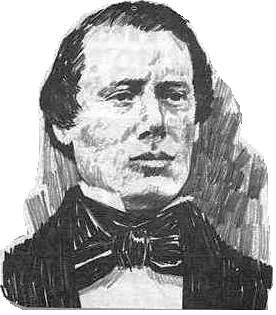 Samuel Harrison Smith was born in Tunbridge, Vermont, on 13 March 1808. He moved with his family to western New York by the 1820s. When his father missed a mortgage payment on the family farm on the outskirts of Manchester Township, near Palmyra, a local Quaker named Lemuel Durfee purchased the land and allowed the Smiths to continue to live there in exchange for Samuel’s labor at Durfee’s store.
Samuel Harrison Smith was born in Tunbridge, Vermont, on 13 March 1808. He moved with his family to western New York by the 1820s. When his father missed a mortgage payment on the family farm on the outskirts of Manchester Township, near Palmyra, a local Quaker named Lemuel Durfee purchased the land and allowed the Smiths to continue to live there in exchange for Samuel’s labor at Durfee’s store.
Samuel was one of the original members of The Church of Jesus Christ. He was baptized by Oliver Cowdery on 25 May 1829. He was also one of the eight witnesses of the Book of Mormon and joined their testimony that “we did handle [the golden plates] with our hands; and we also saw the engravings thereon”.
He is considered to be the first missionary of the Church. As a missionary, he distributed copies of the Book of Mormon to anyone who would receive one, including the brother and brother-in-law of Brigham Young. In June 1832, he and Orson Hyde became the first Latter-day Saint missionaries to preach in Connecticut. They also preached in Boston in June 1832, and as a result of their efforts, branches of the Church were established in Boston and New Rowley, Massachusetts. In July 1832, they went to Providence, Rhode Island, where they baptized two people, but due to threats of violence, they were forced to leave after being there only twelve days. In September 1832, they became the first missionaries to preach in Maine. They also baptized people in Spafford, New York, during their 1832 mission.
When the first High Council of the Church—at the time the chief judicial and legislative body of the Church—was organized on 17 February 1834, Samuel was one of twelve men chosen as a member. In 1835, he was made a general agent for the firm in charge of publishing a Latter-day Saint hymnal and school books for children, working closely with Emma Smith and W. W. Phelps.
According to the 22 February 2015 Deseret News article:
On June 27, 1844, the day Joseph and Hyrum Smith were martyred, sounded a death knell for Samuel Smith as well. He was living several miles outside of Carthage, Missouri, and determined to ride in and see if he could help. But he was pursued and shot at, escaping only because of his endurance and superior horsemanship. He arrived too late but took his place in guarding the bodies of his brothers on their grim journey back to Nauvoo.
However, unable to even sit up because of weakness, he confided to his mother that “he had suffered ‘a dreadful distress in my side ever since I was chased by the mob, and I think I have received some injury which is going to make me sick.’” He died one month later [30 July 1844], truly one of the martyrs to the truth (“Joseph Smith’s Brothers: Nauvoo and after,” by Richard B. Anderson, Ensign, September 1979).
William Smith – The Dissenter among the Ranks
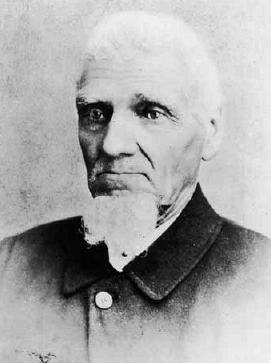 William Smith was the eighth child of Joseph Smith, Sr. and Lucy Mack Smith. He was born on 13 March 1811 in Royalton, Vermont. He was baptized by David Whitmer, one of the Three Witnesses to the Book of Mormon, on 9 June 1830, the same day as his brother Don Carlos. He was ordained an Apostle on 15 February 1835, and became one of the original members of the Quorum of the Twelve Apostles.
William Smith was the eighth child of Joseph Smith, Sr. and Lucy Mack Smith. He was born on 13 March 1811 in Royalton, Vermont. He was baptized by David Whitmer, one of the Three Witnesses to the Book of Mormon, on 9 June 1830, the same day as his brother Don Carlos. He was ordained an Apostle on 15 February 1835, and became one of the original members of the Quorum of the Twelve Apostles.
At the time of the martyrdom of Joseph and Hyrum, William was living in the East. Because of his wife’s poor health, he returned to Nauvoo, Illinois, in 1845. On 24 May 1845, he was called to serve as Presiding Patriarch of the Church in Hyrum’s stead. Shortly after being ordained as Presiding Patriarch, Brigham Young printed a clarification in a church newspaper that stated that William had not been ordained as patriarch over the church, but rather as patriarch to the church. William took offense to the clarification, and the growing tension between himself and Brigham was increased. Smith was patriarch to the church until 6 October 1845 when his name and positions were read at General Conference. Fellow Apostle, Parley P. Pratt, expressed objections based on William’s character and delinquent practices. Those attending General Conference unanimously voted against William being sustained as both an Apostle and as Patriarch and he was disfellowshipped from the Church. He responded by submitting a lengthy statement to the anti-Mormon newspaper the Warsaw Signal in which he compared Brigham Young to Pontius Pilate and Nero and accused him and other members of the Twelve of secretly keeping multiple “spiritual wives.” As a result of his statement he was excommunicated from the Church on 19 October 1845 on the grounds of apostasy.
As a result of his excommunication, he did not follow Young and the majority of Latter-day Saints who settled in Utah Territory and established The Church of Jesus Christ of Latter-day Saints, but rather he followed the leadership of James J. Strang and was involved with the Church of Jesus Christ of Latter-day Saints (Strangite).
In 1847, William announced that he was the new president of the Latter-day Saint church and that he held a right to leadership due to the doctrine of lineal succession. He excommunicated Young and the leadership of the LDS Church and announced that the Latter-day Saints who were not in apostasy by following Young should gather in Lee County, Illinois. In 1849, he gained the support of Lyman Wight, who led a small group of Latter-day Saints in Texas. However, his church did not last, and within a few years it dissolved.
His relationship with Young remained strained until Young’s death in 1877. He believed that Young had arranged for his older brother Samuel to be poisoned in 1844 to prevent his accession to the presidency of the church. Yet, in 1860, he wrote a letter to Young and stated that he desired to join the Latter-day Saints in the Salt Lake Valley. However, shortly thereafter he became a soldier in the American Civil War, and after the war he did not show any interest in moving to Utah Territory.
In 1878, William became a member of the Reorganized Church of Jesus Christ of Latter-day Saints (RLDS Church) which was organized in 1860 with his nephew, Joseph Smith III, as its leader. He died on 13 November 1893 at the age of 82 in Osterdock, Iowa.
A Loving Mother Responds to Death of Sons
I was left desolate in my distress. I had reared six sons to manhood, and of them all, only one remained … as I entered the room and saw my murdered sons … it was too much; I sank back, crying to the Lord in the agony of my soul, ‘My God, my God, why hast thou forsaken this family!’ A voice replied, ‘I have taken them to myself, that they might have rest.
As I looked upon their peaceful, smiling countenances, I seemed almost to hear them say, ‘Mother, weep not for us, we have overcome the world by love; we carried to them the gospel, that their souls might be saved; they slew us for our testimony, and thus placed us beyond their power; their ascendancy is for a moment, ours is an eternal triumph’ (“History of Joseph Smith by His Mother”).
Additional Resources:
Joseph Smith’s Challenging Brother – William B. Smith
About Keith L. Brown
Keith L. Brown is a convert to The Church of Jesus Christ of Latter-day Saints, having been born and raised Baptist. He was studying to be a Baptist minister at the time of his conversion to the LDS faith. He was baptized on 10 March 1998 in Reykjavik, Iceland while serving on active duty in the United States Navy in Keflavic, Iceland. He currently serves as the First Assistant to the High Priest Group for the Annapolis, Maryland Ward. He is a 30-year honorably retired United States Navy Veteran.

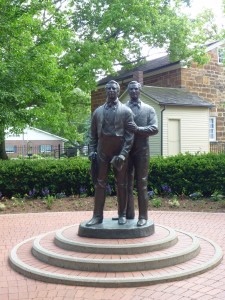
 Watch a video about the restoration of the gospel on lds.org
Watch a video about the restoration of the gospel on lds.org